What exactly are we “celebrating”?

Cristoforo Colombo - Italian, Cristobal Colon – Spanish version, Christopher Columbus - English translation... by any name, was a complicated man.
A genius, a man of and ahead of his time, a great explorer and navigator, the first Conquistador, a murderer, a slaver and a genocidal maniac. Each and every one of those is easily verifiable through the historical record, much in his very own handwriting, as he kept very precise journals.
I have a very ambiguous relationship to him and those who came after, because I am one-third (almost exact numbers based on DNA testing done at the behest of my son) Taino (one of the Arawak tribes that he was responsible for cleansing, in the ethnic sense) I am also one-third African, and as it was he that began that African slave trade, there is no way he can shirk responsibility. The final third European and that is the portion that seems to dominate my appearance and languages (with small exceptions) It is also the portion that is the basis for most of my original worldview, mainly because genocide, when done with the efficiency and to the extent that is the case in the American holocaust is a successful technique, regardless of any moral implications. So it took years of study and UN-learning to see the whole truth, not only about Columbus but the entire history of the colonization, exploitation and subjugation of the Americas.
While the very notion of comparing genocides is anathema, just for perspective, we must. It is without doubt, the most horrific story in world history. Far worse (in numbers) than the Rwanda massacre, Pol Pot's Killing Fields, Nazi holocaust, the barbarism of Attila or even the conquests of the Khans. The many millions who were tortured, mutilated, murdered (so many methods it is impossible to track, including biological warfare) enslaved, worked to death and raped, is incomprehensible. The time span covers centuries, as Europeans spread inland from the coasts. The techniques differed, but the end result was the same.
Throw in the African slave trade (an arguably very close second as far as horrible crimes) and you have one helluva list of crimes, not individual and random, but with purpose and strategy.
And it ALL began with Christopher Columbus "the cross" in one hand and Toledo steel in the other.
His close friend Michele de Cuneo, wrote this account of his rape of a Native female "gift" given to him by Columbus;
"We captured this canoe with all the men. One cannibal was wounded by a lance blow and thinking him dead we left him in the sea. Suddenly we saw him begin to swim away; therefore we caught him and with a long hook pulled him aboard where we cut off his head with an axe. We sent the other Cannibals together with the two slaves to Spain. When I was in the boat, I took a beautiful Cannibal girl and the admiral gave her to me. Having her in my room and she being naked as is their custom, I began to want to amuse myself with her. Since I wanted to have my way with her and she was not willing, she worked me over so badly with her nails that I wished I had never begun. To get to the end of the story, seeing how things were going, I got a rope and tied her up so tightly that she made unheard of cries which you wouldn't have believed. At the end, we got along so well that, let me tell you, it seemed she had studied at a school for whores. The admiral named the cape on that island the cape of the Arrow for the man who was killed by the arrow."
Accounts of cruelty and murder include Spaniards testing the sharpness of their swords by cutting Natives in half, beheading contests and throwing them live into vats of boiling soap. There are also accounts of infants being lifted from their mother's breasts by Spaniards, to be dashed headfirst into large rocks.
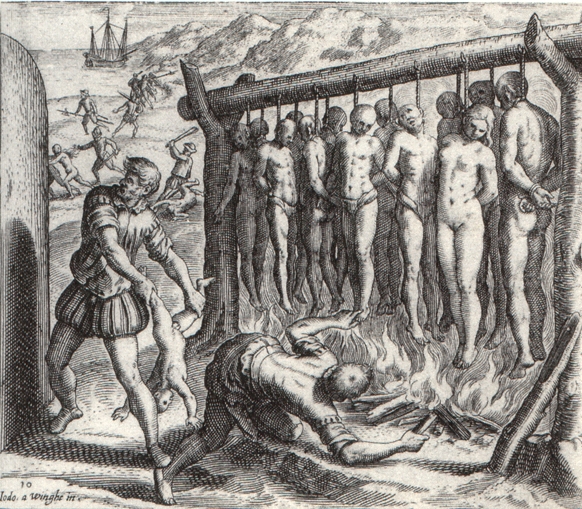
Bartolome De Las Casas, a former slave owner who became Bishop of Chiapas, described these exploits: "Such inhumanities and barbarisms were committed in my sight as no age can parallel," he wrote. "My eyes have seen these acts so foreign to human nature that now I tremble as I write."
Columbus made Natives work in gold mines until they dropped. Those who resisted were beheaded or had their ears cut off. All persons over 14 years of age had to supply at least a thimble of gold dust every three months and then issued copper necklaces as proof of their compliance. If they did not fulfill their obligation their hands were cut off and tied around their necks while they bled to death, more than 10,000 died handless. Cutting ears off, for even minor "offenses" was common.
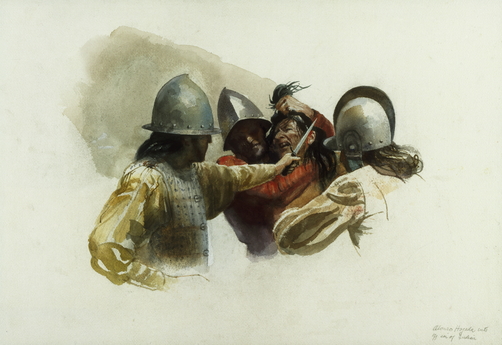
Within two years' approximately 250,000 Indians on Hispaniola (modern Haiti and Dominican Republic) were dead. This included mass suicides, intentional poisonings and mothers killing their babies to avoid persecution.
Columbus sold sex slaves to his men, some as young as 9. He and his men also raided villages for sex and sport. In 1500, he wrote: "A hundred castellanoes are as easily obtained for a woman as for a farm, and it is very general and there are plenty of dealers who go about looking for girls; those from nine to ten are now in demand."
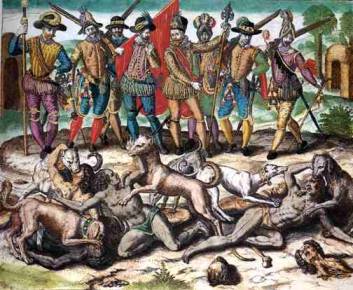
There were butcher shops throughout the Caribbean where Indian bodies were sold as dog food. There was a practice known as the montería infernal, the infernal chase, or manhunt, in which Indians were hunted by war-dogs-dogs. The dogs wore armor and fed human flesh. Live babies were also fed to these war dogs as sport, sometimes in front of horrified parents.
A few years before his death Columbus wrote; "Gold is the most precious of all commodities; gold constitutes treasure, and he who possesses it has all he needs in the world, as also the means of rescuing souls from purgatory, and restoring them to the enjoyment of paradise."
So... I can appreciate the intelligence, bravery and determination it took to convince the Spanish monarchs to fund his expedition(s) accomplish the crossing(s) of the Atlantic, the ability to keep his men from mutiny, the exploration and mapping, the beginning of making the world smaller and more "modern"... all while never forgetting the millions who paid the price.
The question is; do we eliminate Columbus Day in favor of some type of Indigenous Peoples Holiday?
I will leave you to ultimately answer that question, but first let me ask you one that may help clarify it: how can we as a modern nation, who are in process of trying to break from our racist foundations, condone a celebration of the man who opened the door and set the example for the two worst crimes in recorded history?
Dancing in the Street
August 22, 1964 - Martha and The Vandellas debuted at No. 68 on the Billboard Hot 100 chart with their single, "Dancing In The Street." I was only 10 at the time.
Bed-Stuy was still a "mixed" neighborhood back then. Originally mostly Hasidic, there were still many of their families... The first time I ever saw a tattoo from "the camps" was one day when the landlord came by to collect the rent and when I asked what the numbers were for, my mother shushed me and apologized, embarrassed... He lived upstairs, his son Moshe was my best friend and we always played together in the hallways. I remember their entire family along with the others would move out in to the backyard, to a little hut they built every year. When I asked my mom why, she said "Passover" as if that somehow explained it.
That summer seemed like the hottest one ever. In those pre AC days we all spent as much time as possible on the stoops, or hanging from the fire-escapes. The kids; spics, Jews, coloreds, all together, playing while the grownups griped about the weather and sharing the latest gossip.

Then we heard on the news the story of a 15 year old Negro kid who had been shot by a white cop up in Yorkville. He was from Harlem, but was a student in a nearby school and his classmates had seen it all... a "small disturbance" ensued. The next day there was a protest.
The following day, after the kid's funeral, people didn't go home. There was coincidentally a rally by CORE regarding the three civil rights workers that had gone missing in Mississippi... and it all started to become one thing. The cops made statements about it all being a "crime thing" and not political. Malcolm X made a statement warning the police that blacks had guns and would not take it well if the cops started playing rough. Meanwhile the mob got bigger...
Two days later Harlem was in flames, with the nightmarish scenes broadcast on TV and all the adults asking each other if it would spread.
In Brooklyn there was a meeting of the Black Nationalists... the crowd started getting riled up...
There was a troop of mounted cops on Nostrand Ave, just around the corner from my house on Park Place. A sound truck from the NAACP was trying to tell people to stay calm. It didn't go over well. A few guys started rocking the truck and the cops charged in to "rescue the crew".

Then, all hell broke loose.
For several nights I went to sleep to the sound of police shotguns being fired from the rooftops (the cops had learned from Harlem to take the high ground) they would shoot straight into the air, so that the rain of pellets cleared the streets below.
In the morning I went out with my mom, I guess to try and get some groceries. Nostrand Avenue looked like a war zone from a movie. Burned-out cars, broken windows on empty store fronts, blood on the sidewalks... The cops roughly told my mom to take us home. We tried again the next day, but it was worse.
Then that night, it went quiet. Days of riots were over, at least in my neighborhood. They would flare up again all over the country that summer and each time, the adults looked at each other with the same questioning expression they wore that first night when it had started up in Harlem.
The neighborhood was never the same afterwards. The Jews all sold out and left. Even my mom was too scared to stay and we moved to South Brooklyn (Ha!)
That summer, one of the greatest party songs ever was heard everywhere...
Nobody in Brooklyn thought it meant what it meant...
Dancing in the Street - Martha & The Vandellas
RED, WHITE, BLUE and the, "GREEN BOOK," TOO
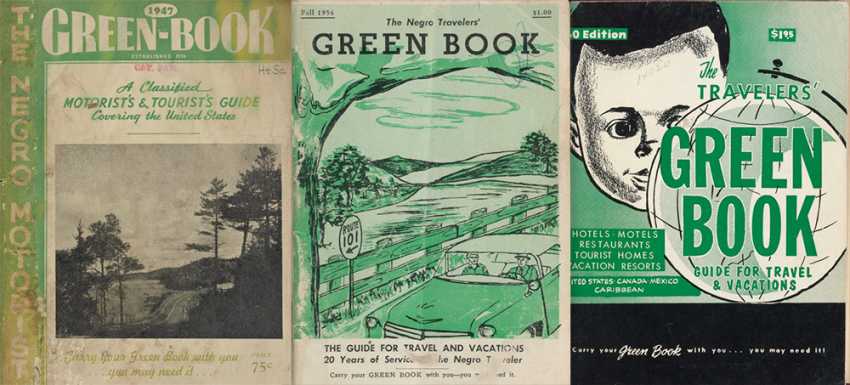
(Elie Wiesel has died. He survived a Nazi concentration camp, and ever since spread the Jewish mantra, “Never Again!” He added, “Never remain silent in the face of oppression.”
Elie Wiesel and this writer were born in the same year. We experienced differenct outrages against humanity in different parts of the world. The following is a portion of my testimonial.)
Upon the signing of the Declaration of Independence, John Adams exhorted the nation to celebrate the occasion, in perpetuity, with great demonstrations of light, sound and jubilation. Adams was addressing a very restricted, “Nation;” it included only his fellow Founders and their immediate ilk. Even as the participants in that nation slowly increased, John Adams’ exhortation did not become generally applicable until the second half of the 20th century!
In the early part of the 20th century, the motor car and paved roads made all parts of the country and its beautiful national parks available to a wider swath of Americans, and international visitors alike. It also prompted the creation of the motor hotel (motel) and roadside eateries such as Howard Johnsons. The problem with this arrangement is that it was not open to all Americans – or dark people in general. Of course this was not a surprise to those among us of devil-darkened hue. Train travel already had established the protocol. The Southern practice of separate railroad cars for Colored only; being refused service in train station restaurants; being hidden behind a curtain in the dining car; being restricted to, “Colored Only” restrooms and drinking fountains was effective training for what lay ahead on the open, motoring road, throughout the entirety of these United States.
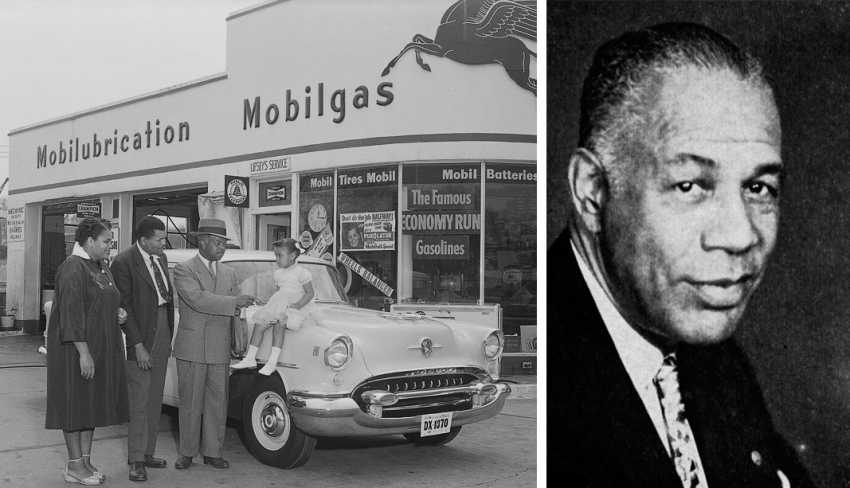
In light of this “Appian Way apartheid,” an enterprising, African American mailman had a, “Lemonade” moment, In 1936, Victor H. Green published the, “Negro Motorist Green Book,” which became known as, “The Green Book.” Green’s publication continued, annually, until 1966. Coordinating information garnered from other mailmen throughout the country, Green was able to pinpoint for African Americans and other melanin-challenged road travelers where they could find accommodations and eating facilities throughout the country.
In the summer of 1941, our family drove from Philadelphia, Pennsylvania to a farm in Amherst, Virginia. I do not know if anyone was aware of the, “Green Book,” but, just as on the train, we carried our own lunch. I do not remember stopping anywhere overnight, so we must have driven straight through or slept in the car.
By all means, let us shout along with “Johnny-come-lately” Adams and his equally tardy compatriots. Let us remind them how their narrow, shortsighted and self-deceiving experiment actually did take root, and that, after many seasons of drought and careless cultivation, their original idea finally has blossomed into a nation worthy of all the hoopla suggested by Mr. Adams.
***** ***** *****
America, Old Gal, it took
A bit to get you off the hook.
You’re down, now, to stay.
Let’s savor the day
And cleanse the bullshit in the book!
Slavery was the cause of the Civil War. End of story.
Yes, there were other issues that helped exacerbate the American Civil war. Yes, most white southerners were not slave holders. Yes, the war aims of Abraham Lincoln were based (originally) on keeping the American union together, not abolition. Yes, the northern trade unions feared the glut of labor that emancipation would bring. Yes, as with all wars and especially civil wars, it was complicated and people (on both sides) had their own reasons for believing that civil war was necessary, but there is no doubt caused by anything in the historical record that contradicts the fact that the PRINCIPLE issue was SLAVERY. The economics were between industry and agriculture as they say, but they leave out that the agriculture was wholly dependent on slave labor. The State's right issue was something that few people at the time thought much about except for ONE issue – slavery. Slavery was the one and only "right" that was in true contention. A quick comparison between the U.S. Constitution and that of the Confederate States of America will quickly confirm.
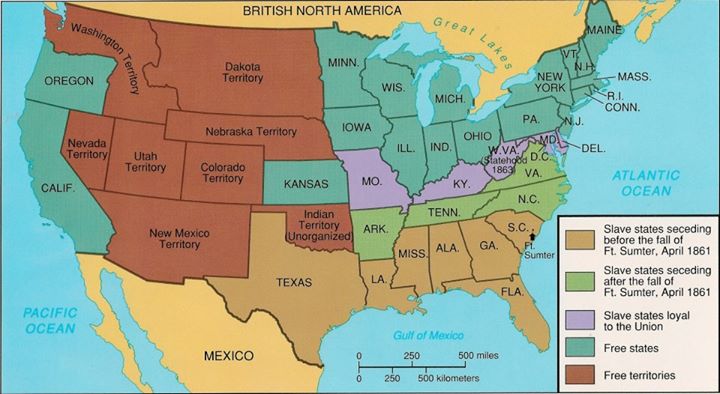
It was the westward expansion of the American nation that was the straw that broke the camel's back. The slaveholders were fully aware of the growing abolitionist movement and when the slave states realized they would soon loose enough votes so that their "property" could simply be taken by passage of law, they knew the only hope to keep their "peculiar institution" would be secession. Jefferson Davis unequivocally stated in 1861 that the cause of his state's secession was that "she had heard proclaimed the theory that all men are created free and equal, and this made the basis of an attack upon her social institutions; and the sacred Declaration of Independence has been invoked to maintain the position of the equality of the races." He "was the champion of a slave society and embodied the values of the planter class, and thus was chosen Confederate President by acclamation". Other Confederate leaders also emphasized that slavery was the cause for secession.
As for who attacked who first, well from the United Sates point of view there was only ONE nation with several of its states in rebellion. A peaceful means was sought to bring the slave states back in to the fold, but once the shots were fired at Fort Sumter by General Beauregard, there was no turning back. At that point Federal forces entered states that were not recognized as independent either in the United States or by any foreign government, so the term invasion is inaccurate, as you cannot invade your own country. Regardless of the language, it changes nothing regarding the source of strife.
As for the bravery of those who fought the war on both sides there can be no doubt. We are talking about the bloodiest conflict our nation has seen right up to this date. The courage it took to make Pickett's charge alone will be the stuff of legend until the end of time. But most of them were fooled into it, in the same way that men of every generation have been fooled in to marching off to war. For example the vast majority of the Wehrmacht was not composed of Nazis, none of them knew about the death camps and few would have sacrificed themselves had they known the depth of the depravity they were part of. Few owned slaves, but they were fed on "southern pride" and racism and the constant drumbeat of "having their rights taken" never questioning the FACT that the only right at issue was slavery.
There is a movement in this country to whitewash the Civil War, to claim it was not really about slavery, to try and take the onus off of the institution and essentially whitewash both its ugly reality and claim that it was little different than what happened to other groups, in other times and places. The beginnings of this "romanticized" version of events, when terms like "our noble cause" were coined goes back to Reconstruction, when the Klu Klux Klan rose from the ashes of the Confederacy. It spread the fallacy that somehow the combatants on both sides were "equals", when to any objective observer there was most definitely a "right" and a "wrong". To honor the "Bonnie Blue Flag" and the "Stars & Bars" and the "Battle flag" as symbols of some idealized "Southern way of life" that by magical means was divorced from the economic foundation of slavery.
It has been reborn every few generations, most infamously in the 1920's when the Klan had a resurgence and even popular entertainment fed in to it (think D.W. Griffith's Birth of a Nation) Old veterans of the so called "war of Northern aggression" were honored, not simply based on the actual bravery (which cannot be denied) but for the stand they took to "defend southern rights"or, slavery.
The modern slant attempts to take advantage of the fact that for most people that era is an obscure subject that may have gotten one semester in high school which covered basic events with little objective analysis and even less "blame" placed. This general ignorance of slavery as the cause of the Civil War is a fertile field for apologists to skew the horror that was perpetrated for hundreds of years and ended only after the country was forced to intercede militarily.
The ultimate goal of this wrongly-revisionist history is to remove any argument for reparations, end programs and roll back laws instituted to bring equality like the Voting Rights Act. That is not to say that any particular individual espousing these views has such nefarious intent, as many are simply victims of the void in their knowledge of actual history and been spoon-fed a diet of lies which was easily digested because of "southern pride".
I have empathy for the sons & daughters of the South, as it must be a difficult thing to have to come to grips with the knowledge that your ancestors were responsible for defending one of the most horrendous crimes against humanity ever perpetrated. I think it is little different than what German citizens have gone through in the process of coming to terms with the past of their national atrocities. But that sympathy should never be reason to allow facts to be buried and ultimate judgment to be affected. For as bad as being a descendant of one of the perpetrators must be, being a descendant of one of its victims is far, far worse. This is especially true because they are still being victimized in countless ways.
This false foundation is being used to once again raise the issue of "state's rights" the same cover that allowed Jim Crow laws to flourish and our country to institute its unique brand of apartheid. For many on the far-right there is a desire to return to some mythical golden years with the basic time frame being the period right after WWII. They see that era as a time when the United Sates of America was powerful on the world stage, the economy was strong and "Christian family values" were the norm. What they refuse to see, is that this too is a fiction. That although that period may have been great for many straight, Anglo-Saxon males, it came at a high cost for everyone else. Segregation still ruled the South, women were "kept in their place", gays could only survive buried in the "closet", Jews were blamed for the world's ills, and "strange fruit" hung from southern trees.
We must confront at every turn the efforts to drag our nation backwards, to eliminate hard won rights, to create a new theocratic oligarchy that has its roots in antebellum America. We fought that war in 1860, again in the 1960's and there are many who itch for a rematch.
I stand by my premise that without slavery there would have never been a civil war, therefore slavery was the fundamental cause. Even the Founders knew when they made the unholy compromise within the Constitution that it was unfinished business which would have to be addressed later.
I just wish we COULD put the Civil War and its cause behind us, but many conversations of late have proven that many still want to rewrite history in a way that makes it a bit more antiseptic. It wasn't. It was filthy, disgusting & evil and there is no way to make it otherwise. Maybe one day we can all simply agree on that and move on. Until then I am doomed to rehash the same facts over and over and try my best to keep new generations from thinking their gran daddy's fought for a noble cause.
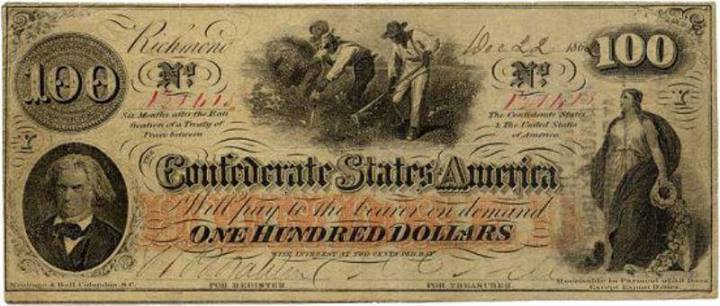
Here are a few quotes from some of the Ordinances of Secession:
Georgia
[Copied by Justin Sanders from the Official Records, Ser IV, vol 1, pp. 81-85.]
The people of Georgia having dissolved their political connection with the Government of the United States of America, present to their confederates and the world the causes which have led to the separation. For the last ten years we have had numerous and serious causes of complaint against our non-slave-holding confederate States with reference to the subject of African slavery.....The party of Lincoln, called the Republican party, under its present name and organization, is of recent origin. It is admitted to be an anti-slavery party. While it attracts to itself by its creed the scattered advocates of exploded political heresies, of condemned theories in political economy, the advocates of commercial restrictions, of protection, of special privileges, of waste and corruption in the administration of Government, anti-slavery is its mission and its purpose.
Mississippi
[Copied by Justin Sanders from "Journal of the State Convention", (Jackson, MS: E. Barksdale, State Printer, 1861), pp. 86-88]
A Declaration of the Immediate Causes which Induce and Justify the Secession of the State of Mississippi from the Federal Union.
".....Our position is thoroughly identified with the institution of slavery-- the greatest material interest of the world. Its labor supplies the product which constitutes by far the largest and most important portions of commerce of the earth. These products are peculiar to the climate verging on the tropical regions, and by an imperious law of nature, none but the black race can bear exposure to the tropical sun. These products have become necessities of the world, and a blow at slavery is a blow at commerce and civilization. That blow has been long aimed at the institution, and was at the point of reaching its consummation. There was no choice left us but submission to the mandates of abolition, or a dissolution of the Union, whose principles had been subverted to work out our ruin...."
South Carolina
[Copied by Justin Sanders from J.A. May & J.R. Faunt, *South Carolina Secedes* (U. of S. Car. Pr, 1960), pp. 76-81.]
Declaration of the Immediate Causes Which Induce and Justify the Secession of South Carolina from the Federal Union
"......
The General Government, as the common agent, passed laws to carry into effect these stipulations of the States. For many years these laws were executed. But an increasing hostility on the part of the non-slaveholding States to the institution of slavery, has led to a disregard of their obligations, and the laws of the General Government have ceased to effect the objects of the Constitution. The States of Maine, New Hampshire, Vermont, Massachusetts, Connecticut, Rhode Island, New York, Pennsylvania, Illinois, Indiana, Michigan, Wisconsin and Iowa, have enacted laws which either nullify the Acts of Congress or render useless any attempt to execute them. In many of these States the fugitive is discharged from service or labor claimed, and in none of them has the State Government complied with the stipulation made in the Constitution. The State of New Jersey, at an early day, passed a law in conformity with her constitutional obligation; but the current of anti-slavery feeling has led her more recently to enact laws which render inoperative the remedies provided by her own law and by the laws of Congress. In the State of New York even the right of transit for a slave has been denied by her tribunals; and the States of Ohio and Iowa have refused to surrender to justice fugitives charged with murder, and with inciting servile insurrection in the State of Virginia. Thus the constituted compact has been deliberately broken and disregarded by the non-slaveholding States, and the consequence follows that South Carolina is released from her obligation. ....."
And finally The Cornerstone speech:
"... allow me to allude to one other though last, not least. The new constitution has put at rest, forever, all the agitating questions relating to our peculiar institution African slavery as it exists amongst us the proper status of the negro in our form of civilization. This was the immediate cause of the late rupture and present revolution. Jefferson in his forecast, had anticipated this, as the "rock upon which the old Union would split." He was right. What was conjecture with him, is now a realized fact. But whether he fully comprehended the great truth upon which that rock stood and stands, may be doubted. The prevailing ideas entertained by him and most of the leading statesmen at the time of the formation of the old constitution, were that the enslavement of the African was in violation of the laws of nature; that it was wrong in principle, socially, morally, and politically. It was an evil they knew not well how to deal with, but the general opinion of the men of that day was that, somehow or other in the order of Providence, the institution would be evanescent and pass away. This idea, though not incorporated in the constitution, was the prevailing idea at that time. The constitution, it is true, secured every essential guarantee to the institution while it should last, and hence no argument can be justly urged against the constitutional guarantees thus secured, because of the common sentiment of the day. Those ideas, however, were fundamentally wrong. They rested upon the assumption of the equality of races. This was an error. It was a sandy foundation, and the government built upon it fell when the "storm came and the wind blew."
Our new government is founded upon exactly the opposite idea; its foundations are laid, its corner- stone rests, upon the great truth that the negro is not equal to the white man; that slavery subordination to the superior race is his natural and normal condition. This, our new government, is the first, in the history of the world, based upon this great physical, philosophical, and moral truth. This truth has been slow in the process of its development, like all other truths in the various departments of science. It has been so even amongst us. Many who hear me, perhaps, can recollect well, that this truth was not generally admitted, even within their day. The errors of the past generation still clung to many as late as twenty years ago. Those at the North, who still cling to these errors, with a zeal above knowledge, we justly denominate fanatics. All fanaticism springs from an aberration of the mind from a defect in reasoning. It is a species of insanity. One of the most striking characteristics of insanity, in many instances, is forming correct conclusions from fancied or erroneous premises; so with the anti-slavery fanatics. Their conclusions are right if their premises were. They assume that the negro is equal, and hence conclude that he is entitled to equal privileges and rights with the white man. If their premises were correct, their conclusions would be logical and just but their premise being wrong, their whole argument fails. I recollect once of having heard a gentleman from one of the northern States, of great power and ability, announce in the House of Representatives, with imposing effect, that we of the South would be compelled, ultimately, to yield upon this subject of slavery, that it was as impossible to war successfully against a principle in politics, as it was in physics or mechanics. That the principle would ultimately prevail. That we, in maintaining slavery as it exists with us, were warring against a principle, a principle founded in nature, the principle of the equality of men. The reply I made to him was, that upon his own grounds, we should, ultimately, succeed, and that he and his associates, in this crusade against our institutions, would ultimately fail. The truth announced, that it was as impossible to war successfully against a principle in politics as it was in physics and mechanics, I admitted; but told him that it was he, and those acting with him, who were warring against a principle. They were attempting to make things equal which the Creator had made unequal."
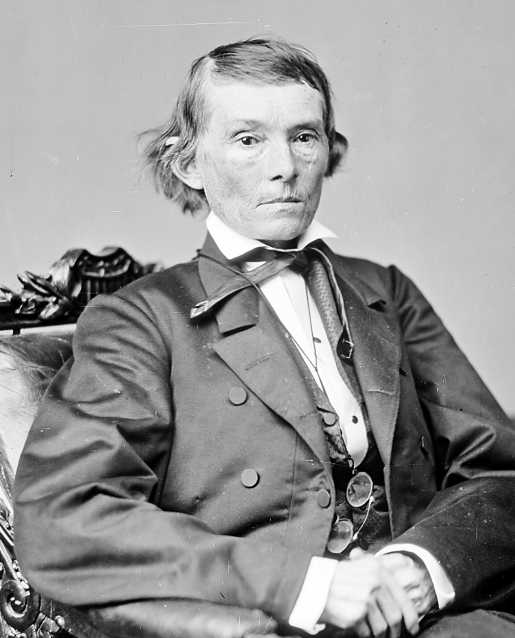
Alexander H. Stephens, Vice President, Confederate States of America
Originally published February 18, 2013
Abuelita
Mi Abuelita (Laura Maria Rosa y Mendez) was born in 1896, two years before Yanqui troops invaded. She and all of my father’s side of the family are Jibaros that come from a small town in the mountains of Puerto Rico called San Sebastian. They were comparatively middle class, at least by pre-conquest standards, as there were many teachers and government employees among them. Laura on the other hand is rumored to have been the “black sheep”, as at some point she was cast out to fend for herself. It is said, she did so by selling ron caña, essentially “moonshine”, made from sugar cane. Pepe, my father was her "lookout" amd one day he fell from the tree he had been perched in and lost his two front teeth. She was briefly married to Esteban Lopez Acevedo at the age of 17. She and had children from different men, Narciso Costa Valdivieso sired Lucy and Carmen. My Grandfather was Jose Antonio Faris a dentist. This explains how my father was given his maternal name and passed it on to me. I of course knew nothing of this as a kid, but when I stated to piece it together, the idea of my sweet, little Abuelita being a bad-ass, always made me smile.

Abuelita after her makeover
One of my father’s half-sisters, Lucy, was the first to move to the mainland. She had met a good man, married and eventuallylived in a house on Long Island that her brother Pepe helped pay for. Not long after she arranged for her mother (abuelita, Laura Rosa) her adopted (de crianza) sister Margie who was given to Laura by her father (Manuel Gonzalez) whosewife (Maria Nieves) had died in childbirth and as he lived in Pueblo Nuevo a bad part of San Sebastián, decided adoption, was the best course. He gave all the money he had to Abuelita to help with the girls' expenses. The little trine included little brother Pepe (my father) to move in to the apartment on Sacket Street. There was another sister, Carmen, but she had married and moved to California and later moved back to La Isla to a House my father bought, to become the matriarch of the Island branch.

Titi Carmen
Abuelita loved to play bolita and it is rumored that she sold it back in the day. Every day a man would show up at her apartment and she would give him a set of numbers and some money. Usually it was just a quarter, but sometimes, if she was feeling lucky she would go as high as $5. I once told her that is she just gave me the money, I would pay her back 75% of it every week and we should both come out ahead, but she just laughed at me. I think over time she actually broke even, at least. I always thought it was ironic, the Pepe (her son, my father) was a big time racketeer, who made a t least a part of his money from the numbers, yet his mom, would play with another collector.
Abuelita would go to the local shops several times a day and exchange gossip and stories. This was a lrage part of her social life. At home she spent much of her time watching telenovelas with a favorite being one name after her, Laura.

A young Titi Margie
Before my mother gave her a “makeover” in the late sixties, Abuelita dressed in the ways of old world widows, her hair done in a bun, and every dress black. All this even though at the time she cannot have been more than mid 50’s. She brought with her the old ways and spoke no English at the time and never did learn much beyond runimentary phrases. Years later, those ways were my ticket to the past, a time of traditional Puerto Rican music. I had no appreciation for the music (at the time) although it did ingrain itself on my brain, probably the best example is a song known to ALL Ricans but especially significant to those outside the Island; En Mi Viejo San Juan. She also had appreciation for more current songs, like one from a Spanish Heartthrob at the time, who had a hit with her name Laura mentioned. There was even a bit of crossover from the Italian neighbors, like Volare.
Then there was the food... Everything made from scratch. Luckily she lived in an old Italian neighborhood, where most items were easily available and those that weren’t could be found in the Bodega down on Columbia Street. Many days were filled going to the live poultry market where she would pick out the chicken and it would be killed and dressed as we waited. There were 3 bakeries within two blocks although she preferred one in particular, so I was often sent with very specific instructions not only which bread she wanted but from which baker. One of those (her second favorite but the only one to survive, until recently) was later featured in the film “moonstruck”.

Cammareri Bros. Bakery
Meals would take forever to prepare, a typical dinner staring early that morning and sometimes the day before. Many hours were spent looking for tiny pebbles among the beans. Before Christmas, all the grandkids would sit around the table grating platanos, yucca and yautia. She made pasteles with raisins, but knew I did not like them, so a special batch without was prepared just for me. A pork roast (pernil) was set to marinate for hours before it ever went near the oven, and the beans would simmer half the day in sauce that I would love to have the recipe for, although of course she did everything by heart.
I mentioned the neighbors upstairs and the mom there was also “old school” but in a very Sicilian way. She too made everything from scratch; homemade pasta, sauces from fresh tomato, etc. One of the few items store bought was sausage, but as there was an Italian butcher on Henry Street, it too was made to the tastes of those who still had memories of the old country. The two woman became friends and often traded dishes, not recipes mind you, but actual food. So when Abuelita made something special there was always an extra casserole to be brought upstairs. In exchange there would often be a knock on the door by my friend from upstairs holding a full tray of lasagna, baked ziti or other dishes straight from heaven above, well, from above anyway.
One of Abuelita’s favorite food items was bacalao (salt cod) which back then was considered ‘poor people’s fish’. She would prepare ‘ensalada de bacalao‘ and potatoes, onions and yucca and bacalaitos which consisted of the fish, dipped in batter and deep fried. For anyone not familiar with it, the fish comes in wooden crates packed with salt so that it requires no refrigeration. The one thing that strikes most right away is its unique smell. Whenever I went to visit her and she was preparing one of these she would playfully put a finger under my nose and laugh as I reacted to the salty stink. One day, when I was around 15, she did as usual. Only this time it was I who laughed and her reaction was basically ‘ah hah!’ and that moment I realized what a wise old woman my little abuelita was.
Last Chapter Begining Next chapter
